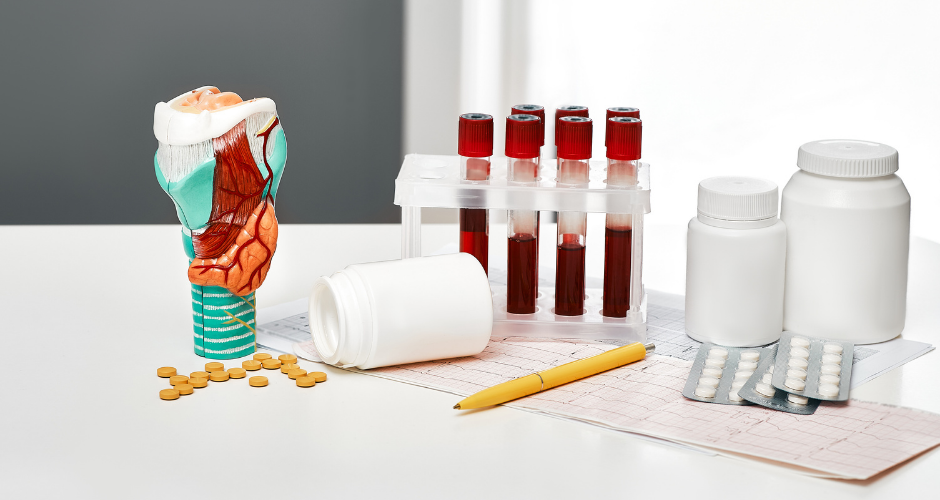Thyroid problems are highly prevalent and they present a real roadblock when you are trying to work on your overall health. Roughly 20 million Americans are struggling with some type of thyroid disease. And up to 60% of those affected have no clue they have it. A staggering 1 in 8 women experiences a thyroid ailment in her lifetime. It’s often thought that thyroid dysfunction only affects women, however, 20% of cases are found in men. (1)
If you suspect an issue or have a family history of thyroid issues, it’s important to have blood work done. Untreated hypothyroidism (underactive thyroid) can lead to a number of health issues, including heart problems, fatigue, pain in the joints, obesity, and infertility. (2)
With a Functional Medicine Approach to Thyroid Health, you can treat both the root cause, as well as the branches (symptoms). Here is a more detailed analysis of what’s causing thyroid dysfunction, including how functional medicine can support you in optimal thyroid health.
Underlying Causes For Thyroid Dysfunction
Many elements can sway thyroid health. Their impact can vary from patient to patient. Problems with the thyroid can occur as a result of: (3)
- Genetic disorders
- Specific medications
- Thyroid surgery
- Radiation therapy
- Cancerous tumor
- Bacteria or virus-induced inflammation
- Autoimmune condition (i.e., Graves’ disease or Hashimoto’s disease)
- Non-cancerous lump (nodule)
- Lack of / excessive iodine
- Environmental toxins
- Diet
- Pregnancy
Research shows that Hashimoto thyroiditis is the most predominant cause of underactive thyroid in the United States. However, on a global level, iodine deficiency seems to be the most prevalent factor. Not having hypothyroidism treated can amplify mortality and morbidity. (4)
Signs of Thyroid Dysfunction
Plummeting thyroid health can impact various body systems, as well as the body as a whole. You will experience different symptoms based on whether you are dealing with an underactive or overactive thyroid. Symptoms can include:
- Changes in weight – An underactive thyroid can lead to weight gain or being unable to curb the extra pounds. Even if you cut the calories and ramp up your physical activity. An overactive thyroid can lead to a drop in weight even if your eating habits haven’t changed. People can remain underweight despite eating more.
- Sensitivity to temperature – An underactive thyroid could make you feel cold, while an overactive one can cause sweating and feeling hot, regardless of the temperature in your surrounding area.
- Exhaustion & sleeping problems – People with an underactive thyroid tend to take longer naps and wake up feeling drained. As if they’ve run a marathon even after an 8-hour sleep. An overactive thyroid could make the heart race, thus hindering your ability to get a shut-eye.
- Complications with the throat or neck – Poor thyroid health can lead to nodules, enlarged thyroid, or neck swelling. The affected area might feel tender and sometimes could cause trouble breathing or swallowing. The neck can appear visibly bigger and cause discomfort and aches.
- Mood disorders and mental instability – Problems like depression, panic attacks, and anxiety can occur if the thyroid is overactive or underactive.
- Change in bowel movements – An underactive thyroid could trigger continuous or serious constipation. Whereas an overactive thyroid can lead to loose stools, diarrhea, or irritable bowel syndrome.
- Problems with menstruation – Hypothyroidism can cause heavier flows and more apparent aches. While hyperthyroidism might cause a lighter flow, shorter menstrual period, and fewer periods. (5)

A Functional Medicine Guide To Thyroid Labs. What Tests Do You Need to Determine Your Thyroid Health?
Thyroid function tests are meant to distinguish an overactive and underactive thyroid from having normal thyroid gland function, as well as determining if there is underlying autoimmunity. To achieve that, various tests are recommended. Medical experts have long relied on TSH (thyroid-stimulating hormone) alone to assess thyroid health. (6)
TSH tests are suggested as first-line screening tests for thyroid dysfunction. They can detect TSH levels less than 0.01 mIU/L. However, focusing only on the TSH misses around 7% of patients with overt thyroid dysfunction. (7)
In the past, the majority of tests for thyroid complications evaluated total thyroid hormone levels. But, since these hormones tend to bind to carrier proteins, mostly thyroid-binding globulin (TBG), conditions that hinder TBG levels, can cause an abnormal total thyroid hormone level. Like an acute disease or pregnancy, even without actual thyroid dysfunction. (8)
Functional medicine practitioners often utilize a full thyroid panel that includes TSH, Reverse T3 (RT3), Free T3 (FT3), Free T4 (FT4), T3 Uptake, Total T3 (TT3), Total T4 (TT4), as well as looking at the antibodies (TPO and TG) that can indicate autoimmunity (Hashimoto’s or Graves’). These tests are capable of evaluating the state of your thyroid, which can be carried out via a blood spot analysis (blood draw).
How Normal is Your “Normal” Result?
Tests meant to evaluate the hormone status of the thyroid gland, such as FT4 and TSH, can have different normal values. During laboratory testing, the normal value is decided by estimating the hormone in a major segment of the population in healthy patients. And measuring that normal reference range.
Therefore, it is possible for the normal range to vary from one laboratory to the other. The typical normal value for the TSH test is from 0.5 – 5.0 mIU/L. Family history of pituitary problems, thyroid carcinoma, pregnancy, and old age are some cases where TSH is optimally maintained. Whereas the typical normal value for FT4 can range from 0.7 – 1.9ng/dL.
The Total T3 and T4 values can be affected by countless factors that impact the protein levels in the system, including liver disease, sex hormones, and some medicines. A normal TT3 level in an adult can vary from 80 to 220 ng/dL. And a normal TT4 level can vary from 5.0 to 12.0μg/dL. (9)
Functional medicine uses a functional range for lab results to provide you with personalized lifestyle, dietary, and nutraceutical protocols.

How Your Thyroid Gland Works
The thyroid gland is a critical hormone gland. It has a major role to play in the development, growth, and metabolism of the human body. It weighs anywhere from 20 and 60 grams on average and is capable of producing three hormones. These are the T4, T3, and Calcitonin. (10)
The gland is a key component of the endocrine system, which is important for producing, storing, and releasing these hormones. The primary function of the thyroid gland is to take iodine and convert it into T3 and T4 hormones. A normal thyroid gland can create roughly 20% T3 and 80% T4. The body will further convert the 80% T4 into T3, which is used by every cell in the body, or Reverse T3, which is not utilized by the body. (11)
For the system to function in optimal shape, T4 and T3 levels shouldn’t be too low or too high. When these levels start to plummet, then the pituitary gland will release more TSH, prompting the thyroid to create more hormones.
But, when the T4 and T3 levels skyrocket, that’s when the thyroid gland slows its hormone production. This is where thyroid medications come into play. Medication can suppress the symptoms of hormonal imbalance and alleviate the discomfort. (12)

The Uncomfortable Truth Behind Thyroid Medications
For around 1 in 7 of the 10 to 12 million American patients with hypothyroidism, conventional treatments with synthetic levothyroxine, just doesn’t cut it. People may keep feeling sick, exhausted, drained, and depressed despite the medication they are taking. (13)
To top it all off, thyroid meds come with a range of side effects. A few examples are: heart palpitations, tremors, hot flashes, mood swings, headaches, and more. In many cases, the doctor will suggest adjusting the dose or changing the medication.
Others take a combination of T3 and T4 to amplify their T3 levels. However, that won’t always ease their lingering symptoms of an underactive thyroid. Thyroid disfunction can be difficult to treat with medication alone, and even more challenging to manage over time.
The Real Reasons Why Your Thyroid Medications Aren’t Working
The actual effect of hypothyroidism, whether it is triggered by autoimmunity or lack of iodine, is that the body is not making enough T3 for the needed bodily functions. Conventional treatment provides T4, which must then be converted into T3. If there is a conversion issue, you may experience the symptoms associated with hypothyroidism, but a limited blood work panel shows everything is in range.
This type of treatment is often frustrating as it ignores the root of the problem and symptoms persist. While it does help a group of patients, for many, it may not be enough to create lasting change and a feeling of well-being. Functional medicine is different. It focuses on the underlying cause to alleviate the problem. (14)
| Functional medicine | vs | Conventional medicine |
| Patient & health-oriented | Disease & doctor-oriented | |
| Holistic approach | Treats patients the same way | |
| Focuses on the cause of the problem | Diagnosis is based on the symptoms | |
| Takes on a preventive approach | Favors early disease detection |
Beware of excipients
Most thyroid medications, in addition to thyroid hormones, contain excipients. Excipients are inactive ingredients used that is used as a carrier for the active ingredient to bind, fill, or dissolve medications. Inactive ingredients may be found in a drug’s capsule, tablet, suspension, or solution form. Some people may be allergic to these inactive ingredients and experience an adverse reaction.
Excipients that are commonly found in thyroid medications include:
- Lactose
- Cellulose
- Starch
- Magnesium stearate
- Silicon dioxide
- Titanium dioxide
- Talc
- Gelatin
- Dyes
These inactive ingredients may trigger an allergic or sensitivity reaction. Synthroid, for example, contains lactose (dairy) and cornstarch (16). If you are allergic to these ingredients, you may experience hives, itching, swelling, trouble breathing, or a rash.

Nutrients For Healthy Thyroid Hormones
Some foods that can be detrimental to thyroid health include highly processed foods, sugar, gluten, and dairy. These foods can be so harmful to thyroid health because they can lead to inflammation, leading to thyroid problems.
When it comes to sugar, it’s essential to be aware that too much sugar can cause your body to produce less thyroid hormone. Many people with thyroid problems are sensitive to gluten and don’t even realize it when it comes to gluten. Even if you’re not celiac, gluten can still cause problems for your thyroid.
In most cases, people can stick to a nutrient-dense diet. But, when their diets fall short of adequate vitamin and mineral intake, that’s where a supplement can come in handy. Individuals on restrictive diets or those who have a thyroid condition can benefit from the right nutrients for their overall health.
Our goal is to use the highest quality nutraceuticals for thyroid health. The primary benefit of nutraceuticals over pharmaceuticals is that they cause little to no side effects. They are easily available and more tailored toward a tight budget. (15)
Options such as selenium, iodine, zinc, and iron can have a notable therapeutic impact. They could better the health value of patients by improving their medical condition. Apex Energetics, based out of Southern California, for instance, tests all of the end products to make sure they are gluten and dairy-free.
Other nutrients that might aid in benefiting adequate thyroid function are vitamins A, E, and B. Having a deficiency in any of these nutrients can have a profound impact on your thyroid health. And amplify the risk of a thyroid complication.
References – Functional Medicine Approach to Thyroid Health
- https://www.thyroid.org/media-main/press-room/
- https://www.mayoclinic.org/diseases-conditions/hypothyroidism/symptoms-causes/syc-20350284
- https://www.healthdirect.gov.au/causes-of-thyroid-problems
- https://www.ncbi.nlm.nih.gov/books/NBK519536/
- https://www.verywellhealth.com/thyroid-disease-symptoms-3233221
- https://www.ncbi.nlm.nih.gov/books/NBK249/
- https://www.rupahealth.com/post/a-functional-medicine-approach-to-thyroid-hormone-labs
- https://www.ncbi.nlm.nih.gov/pmc/articles/PMC6143469/
- https://www.uclahealth.org/endocrine-center/normal-thyroid-hormone-levels
- https://www.ncbi.nlm.nih.gov/books/NBK279388/
- https://www.endocrineweb.com/conditions/thyroid/how-your-thyroid-works
- https://www.endocrineweb.com/conditions/thyroid-nodules/thyroid-gland-controls-bodys-metabolism-how-it-works-symptoms-hyperthyroi
- https://www.endocrineweb.com/conditions/hypothyroidism/five-things-do-if-your-thyroid-hormone-medication-isnt-working
- https://chriskresser.com/three-reasons-why-your-thyroid-medication-isnt-working/
- https://medcraveonline.com/IJCAM/emergence-of-nutraceuticals-as-the-alternative-medications-for-pharmaceuticals.html
- Espaillat, R., Jarvis, M., Torkelson, C., and B. Sinclair. Gluten and Aluminum Content in Synthroid (Levothyroxine Sodium Tablets). Advances in Therapy. 2017. 34(7):1764-1769. doi:10.1007/s12325-017-0575-y


